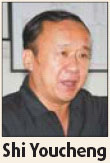The man who drives them 'upstairs'
 In the past two years, 4 billion yuan ($526 million) has flowed through the fingers of Shi Youcheng, yet he works in an office building that seems quaintly in disrepair.
In the past two years, 4 billion yuan ($526 million) has flowed through the fingers of Shi Youcheng, yet he works in an office building that seems quaintly in disrepair.
The chief of Fushun Housing Reform Bureau oversees his city's part of Liaoning's peng gai project, which is the most massive and difficult part. He drives around from one construction site to another, making sure the 2.7 million sq meters of shantytowns are demolished without problem, 4-million-sq-m affordable housing units built to specifications, and a quarter million people happily "moving upstairs".
"Upstairs" has become a catchphrase in Fushun, implying not only the physical move, but a quantum leap in living standards. "What we achieved in the past two-and-half years would have taken 50 years if we had done it the old way," said Shi.
But the miracle could not have happened without government spending. Of the 4 billion yuan invested in Fushun, about half was a bank loan, which will be recouped when land value rises and additional tracts are sold. (The ghettos were mostly cramped houses while the new buildings have five or six stories, housing more people but creating a more spacious community. Hence the extra space.)
About 800 million yuan ($156 million) comes from residents, with each household paying an average of 11,000 yuan ($132) out of pocket. There is a detailed compensation package, with varying rates for different types of housing.
Most units are around 50 sq meters. People who want something bigger than their previous housing can pay a slightly higher rate for the uncompensated portion. Some units are designed to join together if residents buy their neighbor's unit. There are small units for rental, ensuring everyone a place in the new community.
The government chips in some 2.1 billion yuan ($276 million), and on top of that, it waives all kinds of fees and taxes to the tune of 1.4 billion yuan ($184 million). Additionally, Shi's agency saves more than 100 million yuan ($13.2 million) in costs each year, "but we never cut corners in quality".
The bureau closely follows on the market for all material and labor, pushing down prices by buying bulk and hiring no-frills services. To ensure quality, it recruited teams of volunteers from slum dwellers who have engineering backgrounds for an additional layer of inspection. And all financial records are open to public scrutiny.
Working in overdrive, Shi is abrasive when impatient.
But he has reason. For the first 28 years of his life, Shi lived in one of these slums. "When I was 10, I had to use a shoulder pole with two pails and walk 50 meters to fetch water. There was a public toilet in the vicinity, and on rainy days sewage would seep into our shack," he recalled.
Shi's father was a bell ringer for a school and his mom made ends meet by assembling cardboard boxes. He knows firsthand how the poor live and feel. "When people live a better life, it's good for the government and for the economy. Outside investors will be more willing to come here."
On the eve of Chinese New Year, Shi goes to stand in the middle of a refurbished community to see lights from all the windows. "That is the happiest and most rewarding moment of my life," he says.
(China Daily 06/28/2007 page28)














